10 Worst Movies of 2000 (according to the critics)
These films were the worst way to begin the new millennium...

The year 2000 saw the beginning of a new millennium. For years beforehand, people had greeted the upcoming date with one of two emotions. Some were optimistic about a new utopia aided by new, highly-advanced technology. Others were fearful of the Y2K bug set to restart all the world's computers back to zero or just general fear of the unknown. However, by the time 2000 dawned, the world found that while the Y2K bug was a minor issue foreseen by able computer programmers, the world was still a long way from having access to flying cars and hoverboards.
With 2000 designated the International Year For The Culture of Peace, young people celebrated with beach parties and clubbing, knowing that there was now no significant military conflict affecting worldwide wellbeing following the end of the Yugoslav Wars the previous year. The world's youth also welcomed Sony's Playstation 2, a box that would become the best-selling video game console. Meanwhile, adults either voted in the controversial 2000 US presidential election between Al Gore and George W. Bush, tried out the public beta of Apple's Mac OS X operating system or discovered DeviantArt for the very first time.
However, cinema remained a predomiant form of entertainment for audiences of all ages despite these new developments. The year 2000 saw Mission Impossible 2 top the worldwide box office while also witnessing successful big-screen adaptations of How The Grinch Stole Christmas and Stan Lee's X-Men comic books. Meanwhile, films like Gladiator, Traffic, Almost Famous, Requiem For A Dream, Erin Brockovich and Crouching Tiger, Hidden Dragon topped end-of-year critics' lists.
Yet, despite a new year, a new decade, and a new millennium dawning, it did not stop the worst of popular filmmaking from entering the public zeitgeist in 2000. The ten films featured below are the absolute worst discoveries of this new era, as decided by film review aggregator websites Rotten Tomatoes and Metacritic. After searching through the lower recesses of both sites, finding the lowest critical scores and creating an average of both, I have uncovered the worst critically-reviewed films of the 21st century's inaugural year.
Sit back and enjoy. It's going to make for an exciting nostalgia trip.
10. Urban Legends: Final Cut (Dir. John Ottman) 12.5%
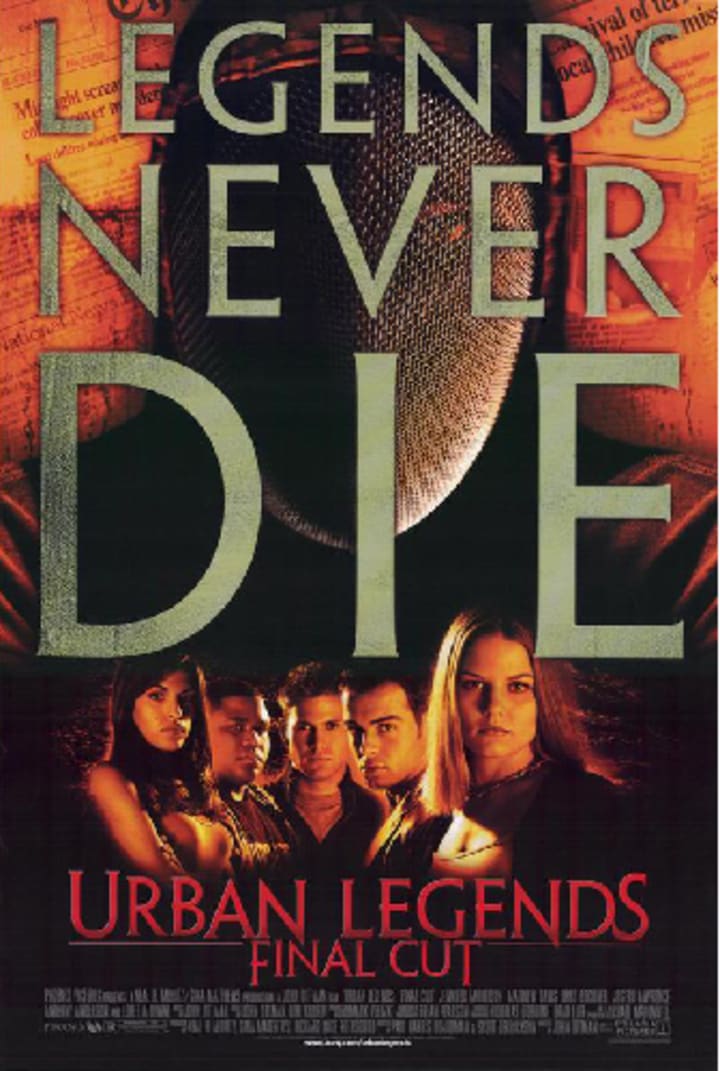
The late 1990s and early 2000s were an intriguing time for horror movies based around young people. Wes Craven's Scream would bring back the slasher movie with a more self-aware bent. The Blair Witch Project would show how to make a horror movie that blurs the lines between fiction and reality (and do it all on the smallest of budgets). Final Destination would introduce a scenario where Death takes revenge on a group of youngsters through a series of unusual chain reactions after the group were smart enough to avoid walking into a deathtrap.
Urban Legend would release around the same time as these tentpole horror films. Urban Legend is a 1998 slasher film where an American university is subject to a series of murders, all modelled after famous urban legends. The film featured a talented young cast, including Jared Leto, Alicia Witt, Joshua Jackson, Tara Reid and Michael Rosenbaum, and horror icons Robert Englund and Brad Dourif. Urban Legend would receive mainly negative reviews, with many reviewers calling it an inferior version of the Scream movies. However, the film would be financially successful, grossing $72.5 million worldwide from a $14 million production budget. These numbers alone were enough for Sony Pictures to greenlight what would eventually become Urban Legends: Final Cut.
John Ottman would direct the film. Ottman was known more for his work as a composer, editor and producer, most notably with Bryan Singer on The Usual Suspects, Apt Pupil and the X-Men series. Before Urban Legend 2, Ottman's only previous directing work had been with Singer, with the pair helming the 1988 short film Lion's Den in both men's directorial debuts. On Urban Legends: Final Cut, Ottman would pull a John Carpenter, providing the film's score and editing the film himself.
Urban Legends: Final Cut focuses on a group of students at a prestigious film school making a thesis film about urban legends. However, the film's director, Amy, struggles to complete the film as her cast and crew members soon perish at the hands of a serial killer wearing a fencing mask. Now, Amy has to defeat and unmask the killer before too late. Like its predecessor, Urban Legends: Final Cut would feature a cast of young hopefuls with Jennifer Morrison, Matthew Davis, Eva Mendes, Joey Lawrence and Anthony Anderson all having featured roles.
As you would expect, Urban Legends: Final Cut would receive a less-than-stellar reception from film critics. The movie would earn 16% on Metacritic from 25 reviews and 9% on Rotten Tomatoes from 85 reviews. RT's critical consensus would read, 'This teen horror movie brings nothing new to an already exhausted genre. And it's bad. Really bad.' Film.com's John Hartl would reference the film's lack of originality, writing 'If you've seen one "Scream" rip-off, you really have seen them all.'
Meanwhile, Ty Burr of Entertainment Weekly would give the film a vomit-inducing score of zero, simply referring to Urban Legends: Final Cut as 'debased swill'. However, this sequel would perform well at the box office despite the hostile reception. The film would top the US box office and eventually finish with a worldwide gross of $38.4 million, effectively making a profit against its $14 million budget. However, the gross of Final Cut was almost half of what the original Urban Legend had made ($72 million) three years earlier.
Earning less than its predecessor and an abysmal critical reception saw Sony lose confidence in the Urban Legend series. However, the franchise would receive one more entry, the 2005 direct-to-DVD effort Urban Legends: Bloody Mary.
9. Dungeons & Dragons (Dir. Courtney Solomon) 12%
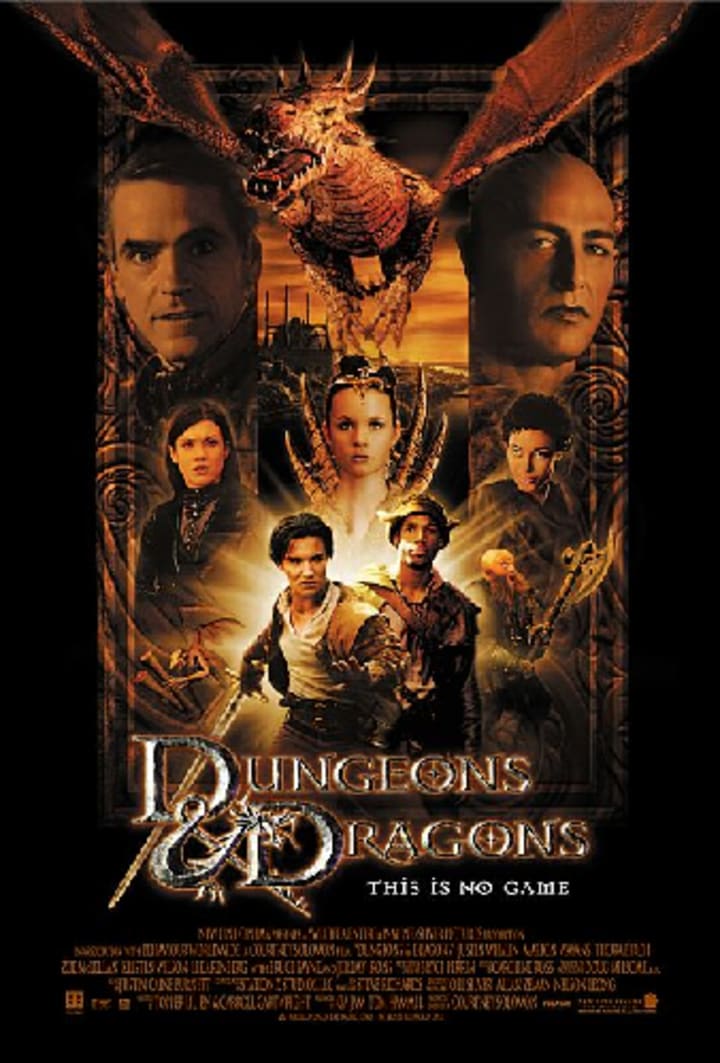
Do you want terrible CGI? Do you want scenes where underacting meets overacting, chewing the scenery clashes with someone phoning it in? Do you want the craziest performance of Jeremy Irons' career? Have you ever wanted to see Marlon Wayans appear in a fantasy film? If the answer to any of those questions is yes, then you will love the 2000 film adaptation of Dungeons & Dragons. However, suppose the answer to any or all of those questions is no. In that case, you are like 90% of the critics who saw this movie, and you are correct to forego watching the 2000 film adaptation of Dungeons & Dragons unless you are looking for a suitable candidate for a 'bad movie night'.
Based on the tabletop role-playing game of the same name, Dungeons & Dragons would be helmed by first-time director Courtney Solomon and produced by Joel Silver. The movie would be released by New Line Cinema, the same studio set to distribute a trilogy of films based on J.R.R Tolkien's The Lord of the Rings beginning in 2001.
What is the plot of Dungeons & Dragons? The land of Izmer is ruled over by the magic-wielding Mages, while the common folk are left to live underneath. The young Empress Savina (played by Thora Birch) wishes to provide equality and prosperity to Izmer. However, the evil wizard Profion (Jeremy Irons) wishes to overthrow her by taking a Golden Scepter that control's the kingdom's Golden Dragons. However, Savina herself seeks the Rod of Savrille, a MacGuffin that can control another set of dragons known as Red Dragons. Enter thieves Ridley (Justin Whalin) and Snails (Marlon Wayans), who somehow get involved with the quest for the Rod. Aided by a young mage called Marina (Zoe McLellan), a dwarf named Elwood (Lee Arenberg) and the Empress's tracker elf Norda (Kristen Wilson), the thieves attempt to find the Rod of Savrille while Profion tries to stop them.
Despite being based on the world's most popular tabletop role-playing game, Dungeons & Dragons would become one of the biggest box-office failures of 2000. On its opening weekend, the film would finish 5th at the US box office and 8th in the UK, eventually recouping just $33.8m of its $45m production budget. The film would also perform poorly with the critics. Dungeons & Dragons would earn eight nominations at the Stinkers Bad Movie Awards (Worst Picture, Worse Sense of Direction, Worst Supporting Actor, Worst Supporting Actress, Worst On-Screen Group, Most Intrusive Musical Score, Least 'Special' Special Effects and Most Unfunny Comic Relief), managing to escape with zero wins. Variety's Scott Foundas would say that "The average episode of Xena or Hercules offers a more compelling and imaginative photoplay." Meanwhile, a cutting Roger Ebert would say that "Dungeons & Dragons looks like they threw away the game and photographed the box it came in."
While this film's reception killed off any hopes of any more big-screen entries in the Dungeons & Dragons, the movie series would continue in other forms. In 2005, a stand-alone sequel titled Dungeons and Dragons: Wrath of the Dragon God would air on the Sci-Fi Channel and see a limited theatrical release in parts of Europe, South America and the Middle East. Then, in 2011, a second sequel, Dungeons & Dragons 3: The Book of Vile Darkness, would release directly on DVD and Blu-Ray.
When asked later why he chose to appear in Dungeons & Dragons, Jeremy Irons would say, " I'd just bought a castle. I had to pay for it somehow!" Sums up his performance perfectly.
8. Lost Souls (Dir. Janusz Kamiński) 12%
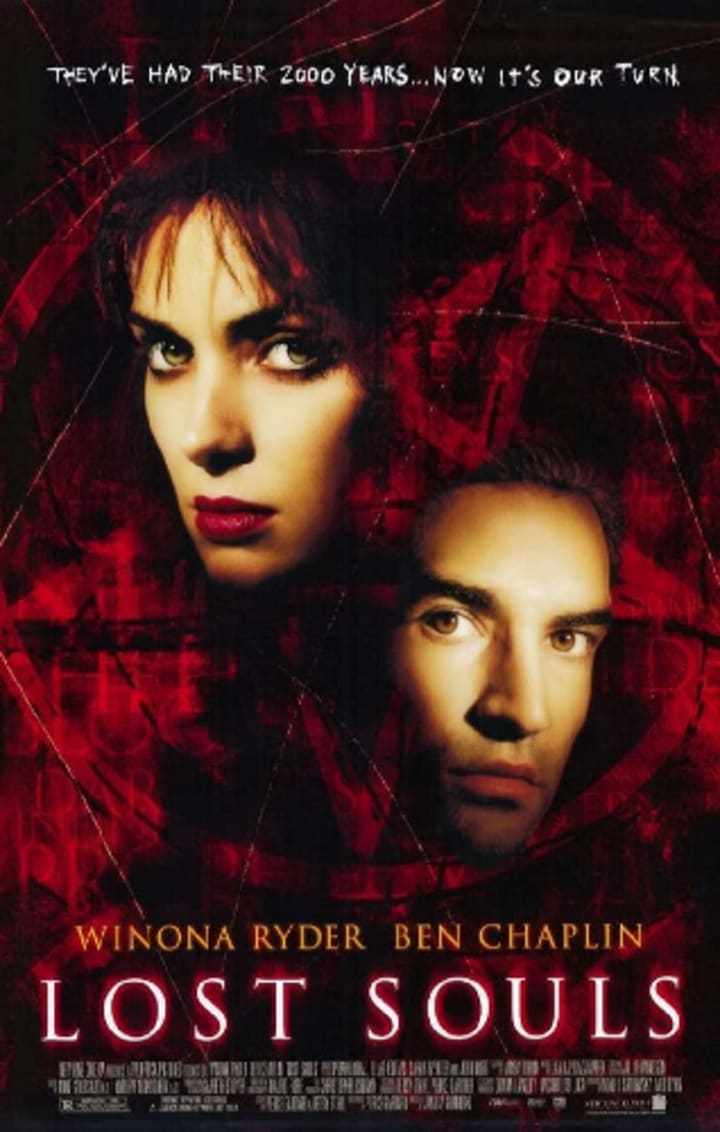
Remember when Winona Ryder was everywhere? After making her big-screen breakthrough in 1988's Beetlejuice, Ryder would make 25 films over the next 14 years until a 2001 shoplifting arrest slowed her down and saw her retreat into the shadows. Heathers, Edward Scissorhands, Mermaids, Bram Stoker's Dracula, Reality Bites, The Crucible, Alien Resurrection and Girl Interrupted, plus Oscar-nominated roles in The Age of Innocence and Little Women, Winona Ryder had a significant film out every year in the 1990s. However, in the first year of the new millennium, Miss Ryder would release a pair of stinkers. One was the Richard Gere co-starring May-December romance Autumn in New York, and the other was the horror movie known as Lost Souls.
In Lost Souls, Winona Ryder plays a young Catholic teacher who learns of a conspiracy to have Satan walk the Earth in human form as the Antichrist. She meets the target of this conspiracy, an atheist journalist played by Ben Chaplin, and must convince him of his impending fate to undo this dark future.
Lost Souls would mark the directorial debut of two-time Oscar-winning cinematographer Janusz Kamiński, the go-to man for one Steven Speilberg. By the year 2000, Kamiński and Spielberg had combined on Schindler's List, The Lost World: Jurassic Park, Amistad and Saving Private Ryan and the Pole would work with Spielberg a further fifteen times afterwards. The work of Barry Sonnenfeld and Jan de Bont, two other cinematographers-turned-directors, has led to mixed results, and it is no surprise to find that Janusz Kamiński never directed another Hollywood movie after Lost Souls.
New Line initially set Lost Souls for a theatrical release in October 1999. However, due to similar religious-based action and horror films like Stigmata and End of Days coming around the same time, the film was delayed until the following year. This delay would not help the movie either critically or commercially. Lost Souls currently holds an 8% rating on Rotten Tomatoes and 16% on Metacritic. Peter Travers would write, 'With the original Exorcist back at the multiplex, you don't need this pale copy'. Time Out's Nigel Floyd would say, 'The tedious storytelling sucks the life and soul out of the characters far more effectively than Satan ever manages.' The film would also become one of four 2000 films to receive an 'F' from Cinemascore audiences and currently holds bad user scores on Rotten Tomatoes, Metacritic and IMDB.
Produced on a budget of $50 million, a lot for a horror film in 2000, Lost Souls would gross $31.3m back, finishing as the 100th highest-grossing film worldwide in 2000.
7. Whipped (Dir. Peter M. Cohen) 11.5%
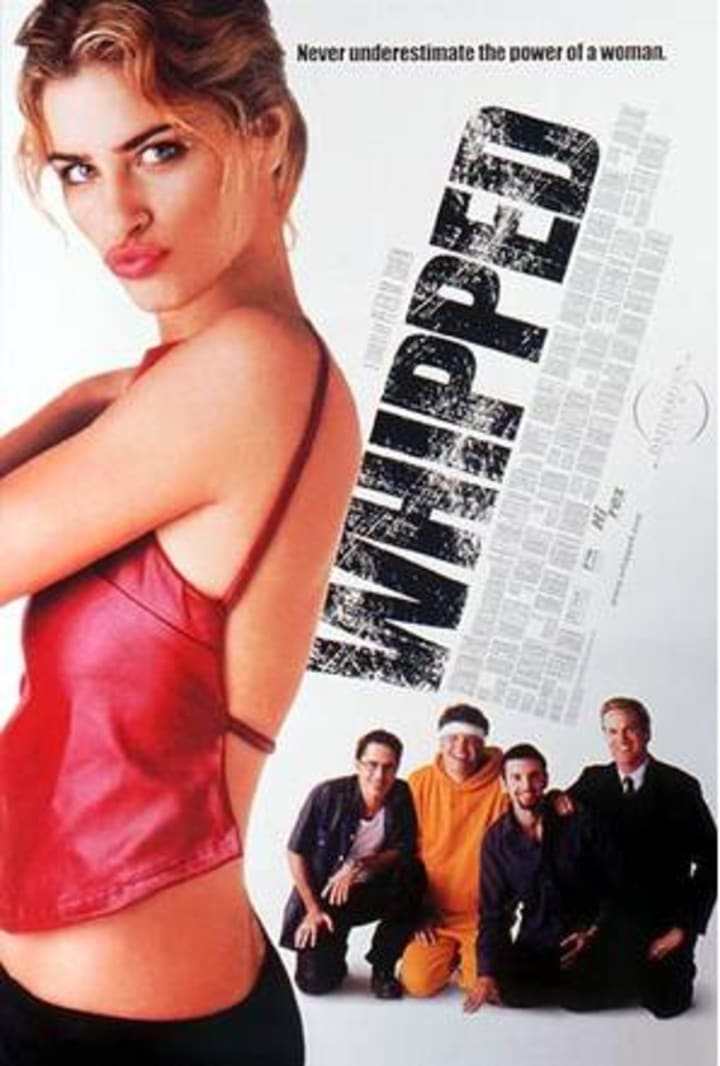
When you plan to release a film bearing the title 'Whipped' to a worldwide audience, you had better be confident in your abilities as either the film's writer, editor, producer or director. Peter M. Cohen must have been back in the year 2000, for as the director, producer and writer of Whipped, he was happy to let this sex comedy go to wide release.
Whipped is a movie about three single friends who meet up each week to discuss each other's sex lives. All three men consider themselves swingers, who do not stay with women beyond one night. However, when all three friends start dating the same woman (played by Amanda Peet), their previously secure friendships are now put to the test.
Sex comedy films are often hard to get right. Whipped sets out to prove that rule. The film earned 13% on Rotten Tomatoes and 10% on Metacritic. Critics called the film vulgar, cynical, mean-spirited and unfunny. Ken Fox of TV Guide would sum up Whipped as "A misconceived roundelay that crosses the thin line dividing gross-but-funny from just plain gross." Meanwhile, Gene Seymour of Newsday would go further, saying, "Its soul is ugly, and what little brains it has are shrink-wrapped in bile." However, the film would become a minor box-office success, making $4.8m against its low $3m production budget.
However, the critical hatred for Whipped would not stop the rise of Amanda Peet. The kindest of reviews for Whipped would even praise her performance amidst all the other sludge. The success of The Whole Nine Yards, released the same year, would also help, leading to Amanda Peet riding out this minor failure to become one of the 'it-women' of the 2000s. Meanwhile, Peter M Cohen would never direct another theatrical film, moving into directing reality television shows like Mystery Diners.
6. Bless The Child (Dir. Chuck Russell) 10%
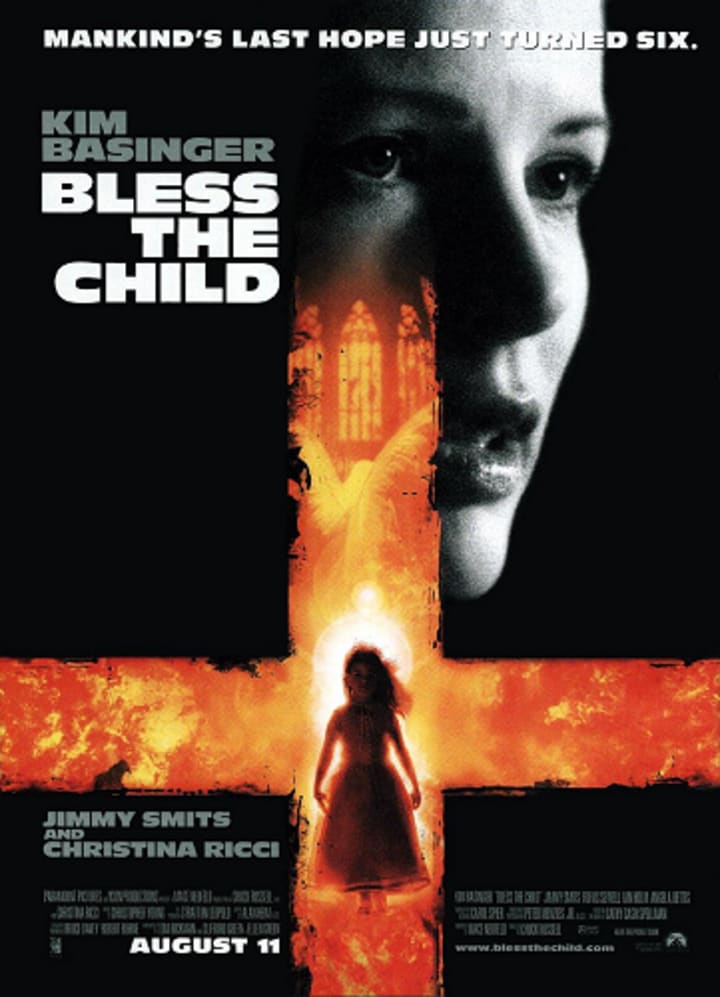
The fifth entry on this list, and we already have our third horror film. Now, we get to Kim Basinger screwing away the goodwill she had earned from LA Confidential. After taking a three-year break following her Oscar win, Basinger would return with two of the year's worst films. May 2000 would bring the biopic I Dreamed of Africa, a box-office failure from Paramount Pictures. August 2000 would unearth Bless The Child, a supernatural horror from Chuck Russell, the man behind A Nightmare of Elm Street III, The Blob, The Mask and Eraser.
The plot of Bless The Child sees Kim Basinger play Maggie O'Connor, a woman who takes guardianship of her niece Cody (Holliston Coleman) from her homeless sister. When the niece is kidnapped, Maggie discovers that Cody has certain supernatural powers and teams up with an FBI agent (Jimmy Smits) to find her. At the same time, a Satanist cult that is behind a series of child kidnappings want to find Cody and turn her to the side of evil.
Like I Dreamed of Africa, Bless The Child would be a failure at the box office and in the eyes of critics. The film would open 7th at the UK and American box offices, finishing with a $40m worldwide gross against a $65m budget. However, the critical results were somehow worse. Bless The Child currently ranks 64th on Rotten Tomatoes' 100 Worst Films Of All Time. It currently holds a consensus score of 3% from 111 reviews. Dave McCoy of the Seattle Times would exclaim that Bless the Child was "A biblical "thriller" so predictable and preposterous that everyone involved should be banished to the confessional for their sins". Mark Holcomb of The Village Voice would say, "If you're so inclined, pray that the responsible parties crawl back into whatever hole they emerged from."
If that wasn't enough, Kim Basinger would earn a Razzie nomination for her performance in this film, eventually losing to Madonna for The Next Best Thing. After Bless The Child, Kim Basinger's career as a leading actress would never recover.
5. Screwed (Dir. Scott Alexander and Larry Karaszewski) 8.5%
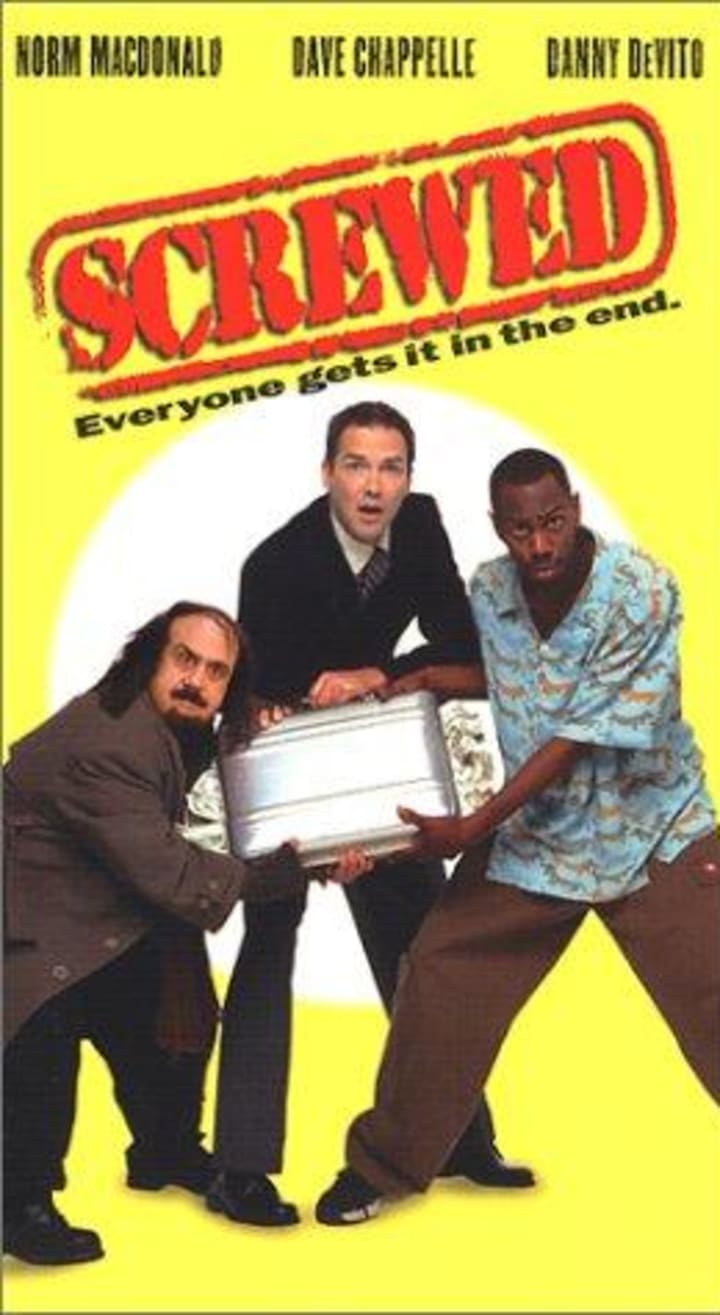
It is a massive shame that Norm MacDonald is no longer around to spread his comedic genius. Search for Norm MacDonald clips on YouTube, and you will laugh yourself silly through his appearances on chat shows, podcasts and Saturday Night Live. Speaking of SNL, MacDonald would suffer an acrimonious exit from the show in 1998 after losing his job as 'Weekend Update' host following a series of ongoing jokes about OJ Simpson. Following his departure, producers rushed to work with Norm, leading to two starring roles in movies and a sitcom on ABC. The first movie, Dirty Work, a film co-written by and starring MacDonald, would fail critically and commercially upon its release in 1998 but has since become a cult classic. Norm's second movie, Screwed, released in 2000, is yet to receive a positive critical reappraisal.
In Screwed, Norm MacDonald would star as Willard, a dissatisfied chauffeur for an heiress who decides, along with his best friend (Dave Chappelle), to kidnap his boss's dog and hold it for ransom. However, the heiress and the police misinterpret the ransom note and believe that Willard has himself been abducted. Now, Willard pretends to be kidnapped and enlists the services of a morgue worker (Danny DeVito) to help his boss pay up.
Unlike Dirty Work, Screwed would not receive any writing input from Norm MacDonald. Instead, the duo of Scott Alexander and Larry Karaszewski, the acclaimed writers of Ed Wood and The People vs Larry Flynt, would write this movie together. Screwed would also mark the pair's directorial debut.
Somehow, despite being made on a relatively low budget of $10 million, Screwed still managed to be a commercial failure. The film would open 8th at the US box office with an opening weekend of $3.3 million, releasing the same week as another film on this list. Stay tuned. Despite featuring Danny DeVito as one of the three headliners, Screwed would finish with a worldwide gross of $7.2 million.
Screwed would end Norm MacDonald's brief time in the limelight. ABC would cancel his sitcom Norm the following year, and he would return to his role as an excellent supporting player and the best chat show guest ever. RIP Norm. Too bad this film couldn't be better.
4. Down To You (Dir. Kris Isaacson) 8%
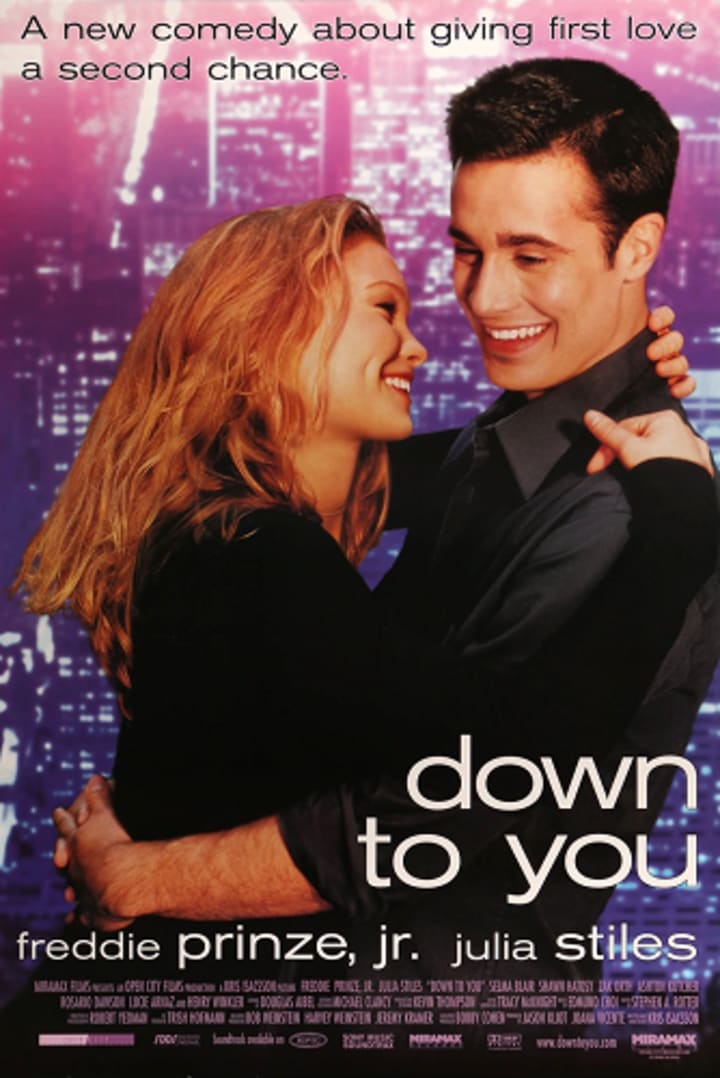
Hollywood tried to make Freddie Prinze Jr. a leading man. Son of a famous actor, Prinze would find fame in the late 1990s with the dual successes of 1997's I Know What You Did Last Summer and 1999's She's All That. Hollywood would then push on despite the high-profile failure of Wing Commander the previous year, casting Freddie alongside fellow rising star Julia Stiles (fresh off her breakout role in 10 Things I Hate About You) in the romantic comedy Down To You. Also featuring would be Selma Blair, Rosario Dawson, Ashton Kutcher and Henry Winkler.
Down To You tells the story of Al and Imogen. The pair begin dating while attending college in New York City and quickly fall in love. However, Al and Imogen's romance then proceeds to have its ups and downs, eventually resulting in the pair breaking up. Now, Al has to try to win back the love of his life and will resort to desperate measures to do it.
Released by Miramax, Down To You would mark the writing and directing debut of Kris Isaacson. Issacson's only previous movie work was a 1997 short film called Man About Town, in which he directed, edited, produced and acted.
Like Wing Commander, Down To You would be a critical and commercial failure. Seemingly dumped by Miramax at the start of the year on 21st January 2000, the film would gross $24.4m at the worldwide box office. Down To You would debut 2nd at the US box office in its opening weekend but would quickly fade away, failing to recoup its $35 million budget.
Down To You would earn consensus scores of 3% on Rotten Tomatoes (60 reviews) and 13% on Metacritic (21 reviews). Reviewers would view Down To You as a weak, toothless teen rom-com that sappily conveys the rollercoasters of emotions that is young love. Wesley Morris of the San Francisco Examiner would claim that the film made him "tired of being a teenager". Entertainment Weekly's Owen Gleiberman would give the movie an F grade, stating [Down To You] is like watching the dreckiest of teen puppy courtships trying to pass itself off as 'Annie Hall'. Finally, The Austin Chronicle's Marc Savlov would be predictive in his analysis, announcing, "This, then, is the death of the teen comedy" in a 0/5 review.
Despite the failure of Down To You, Freddie Prinze Jr would continue to be cast as the leading man in romantic comedies, with Boys and Girls released later in 2000 and the double punch of Head Over Heels and Summer Catch coming out the following year. Meanwhile, Julia Stiles would feature in the modernised film versions of Hamlet and Othello (AKA O) before leading another hit film with Save The Last Dance in January 2001. For Kris Isaacson, Down To You would serve as the only theatrical film he ever wrote and directed. Since then, Isaacson has worked in the TV movie sphere, helming such titles as Husband For Hire, An Imaginary Bride and Tempting Adam.
3. The in Crowd (Dir. Mary Lambert) 8%
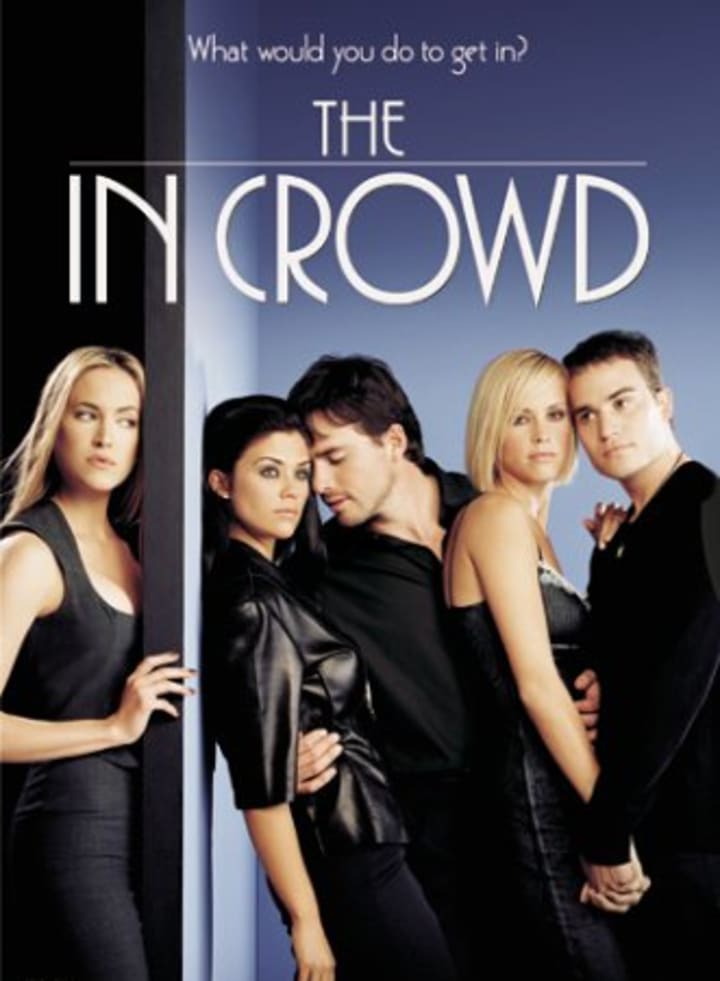
Teen thrillers are a sub-genre that produces more misses than hits. I would ask any reader of this to think of a good teen thriller from the past 30 years. Thrillers and not coming-of-age films, as there are already plenty of great coming-of-age films made within the past 30 years. Maybe it's writing about all these bad movies, but I can't think of one myself. However, Mary Lambert's The in Crowd is not a good teen thriller or even a good motion picture.
In The in Crowd, a young woman named Adrien, recently released from a psychiatric hospital, gets a job working at a country club and is soon accepted into a clique of wealthy college students. However, once Adrien starts dating the ex-boyfriend of group leader Brittany, Adrien's new friends soon begin to show a darker side to themselves.
Featuring a bunch of unknowns in the leading roles, The in Crowd would struggle to attract an audience, making $5 million from a $13 million budget. The film would open 12th at the US box office with an opening weekend gross of $1.5 million, earning less than the 5th week of Chicken Run and the 8th week of Big Momma's House. These pathetic numbers were corroborated by The in Crowd's dreadful critical reception.
Only 2% of 60 critics would give the film a positive review on Rotten Tomatoes. The consensus on the site states: 'A dull, soapy potboiler that lacks the energy to qualify as a guilty pleasure, The in Crowd is undone by slow pacing, poor acting, and a stunning lack of originality.' Writers from the New York Daily News and AV Club would compare The in Crowd unfavourably to the types of films shown on late-night cable and Cinemax. Even the BBC's Jason Korsner would write, "What on earth possessed anyone to put it on the big screen?" Critics viewed The in Crowd as a silly, uninvolving, formulaic and trashy teen melodrama that wouldn't have worked even as an Aaron Spelling TV series.
The in Crowd would be one of two films on this list to be produced by Morgan Creek Entertainment. The other, much worse example to come from this company would be...
2. Battlefield Earth (Dir. Roger Christian) 6%
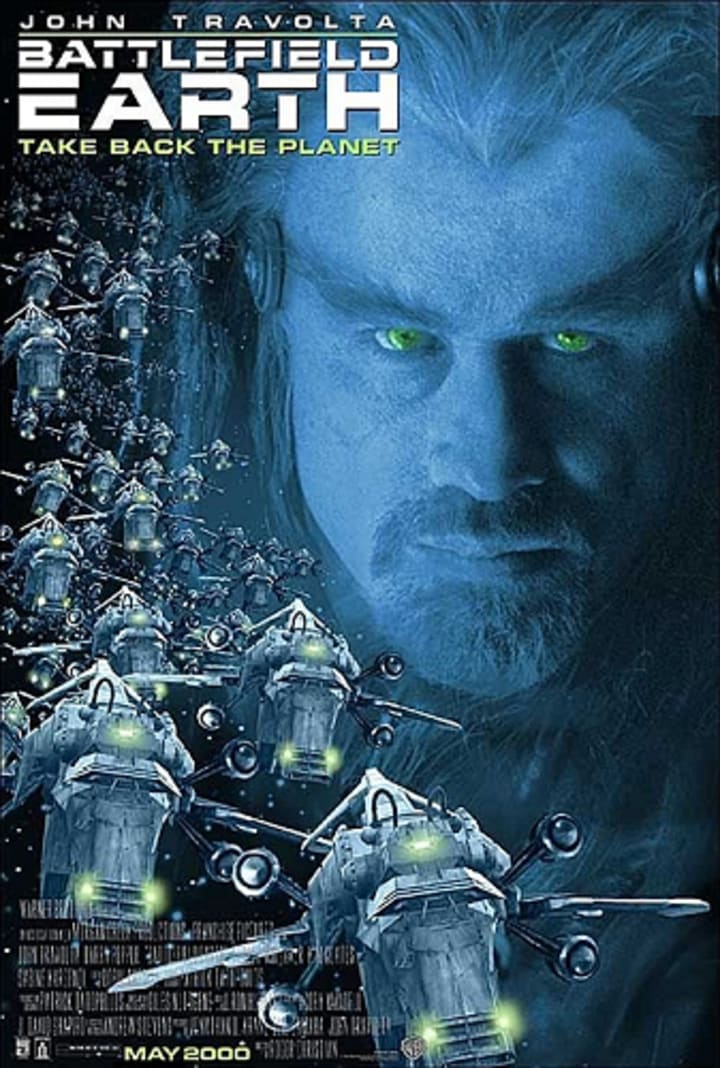
Probably the least surprising film featured on this list. Battlefield Earth (or Battlefield Earth: A Saga of the Year 3000 to give it its full title), the film adaptation of the 1982 L. Ron Hubbard novel, is often considered one of the worst films ever made, so it should come as no surprise that the film was the second worst-received movie of the year 2000. What is intriguing is which movie managed to beat it to the top spot.
So Battlefield Earth is a near 2-hour film about a version of Earth set in the year 3000. The world has become a desolate wasteland under the control of the alien Psychos for the past 1,000 years. The Psychos have enslaved the human race to strip the Earth of its natural resources. After 1,000 years of torment, one human slave named Jonnie 'Goodboy' Tyler (Barry Pepper) launches a rebellion against the Psychos and their leader Terl (played by John Travolta).
Battlefield Earth had been a John Travolta passion project since L. Ron Hubbard gave him a copy of the book back in 1982, hoping the then-hot actor could get Hollywood to make a film adaptation. After going through a career slump, Travolta would renew calls and funding for a Battlefield Earth movie following his comeback in 1994's Pulp Fiction. After much work, including failed distribution deals with MGM and 20th Century Fox, Franchise Pictures would buy the rights to Battlefield Earth. British director Roger Christian came in to direct the picture, and Warner Bros. agreed to distribute the project on a production budget of $73 million.
In its opening weekend, Battlefield Earth would finish 2nd at the US box office, making $11.5 million. However, the film's box office gross would drop by 66% once everyone had seen and spread the word to their friends. The highest-budgeted movie on this list with a cost of $73 million, Battlefield Earth would finish up with a gross of $29.7 million.
With critical scores of 3% on Rotten Tomatoes and 9% on Metacritic, Critics would receive Battlefield Earth so poorly it became a joke. Everything from the plot to the weird, campy acting to the unusual cinematography, which relies heavily on 'dutch angles', received scorn from audiences and critics. The film currently holds a CinemaScore grade of a D+, showing that even general cinema-going audiences disliked this movie. Nathan Rabin of The AV Club would say that "Battlefield Earth is bad enough to make audiences ashamed to be part of the same species as the people who made it." The great Roger Ebert would write, "Battlefield Earth is like taking a bus trip with someone who has needed a bath for a long time. It's not merely bad; it's unpleasant in a hostile way", giving the film a 0.5 out of four stars. Finally, the London Evening Standard critic Alexander Walker would simply call the film "Appalling".
Battlefield Earth would appear on many lists describing the worst films of 2000. The film would sweep the Golden Raspberry Awards, winning seven out of eight nominations, including Worst Picture, Worst Actor, Worst Supporting Actor, Worst Supporting Actress, Worst Screen Couple, Worst Director and Worst Screenplay. These awards would tie the film with the most Razzies earned for a single movie, along with Showgirls in 1995. However, Battlefield Earth would later take the record with awards for Worst Drama of Our First 25 Years in 2005 and Worst Film of the Decade in 2010. Battlefield Earth would also win eight Stinkers Bad Movie Awards for Worst Picture, Director, Actor, Supporting Actor, On-Screen Couple, On-Screen Group, and On-Screen Hairstyle, Most Unintentionally Funny Movie and Least 'Special' Special Effects.
Finally, Battlefield Earth would end John Travolta's hot streak dating back to his Oscar-nominated role in Pulp Fiction. Travolta being in the leading role, acting as a producer and appearing on all the promo art would not help his career, and Battlefield Earth would put him in the gutter for around six to seven years.
1. 3 Strikes (Dir. DJ Pooh) 5.5%
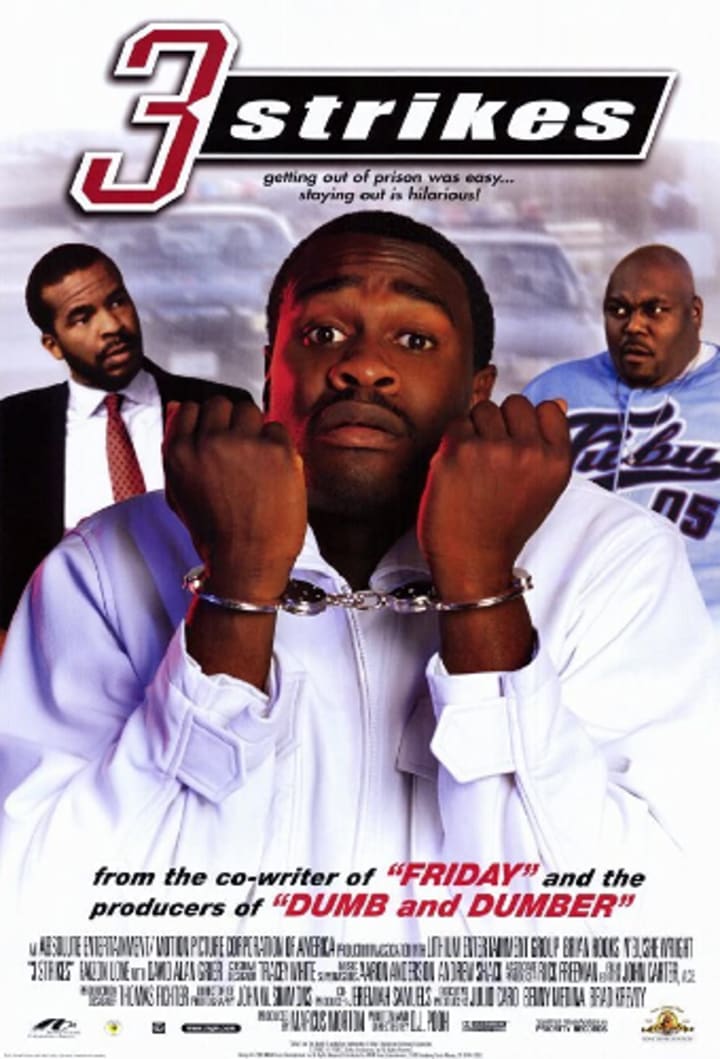
'Getting out of prison was easy...staying out is hilarious!' So reads the tagline on the poster for 3 Strikes, the comedy movie directed by record producer and rapper DJ Pooh. 3 Strikes comes from the same school of comedy that first found success with Friday, the 1995 stoner comedy starring Ice Cube and Chris Tucker. With Ice Cube, DJ Pooh had co-written and acted in Friday, which earned positive critical notices and was a surprise hit at the box office, making back its $3.7 million budget eight times over. Five years later, Pooh, who had produced such influential albums as 2Pac's All Eyez On Me, and Snoop Dogg's Tha Doggfather, would try to direct a motion picture. As well as sitting in the big chair, DJ Pooh would solely write this movie himself and appear in a small role. The result would be the comedy known as 3 Strikes.
The plot of 3 Strikes revolves around Rob Douglas, a man who had just been released from his second stint in prison. Knowing that a third conviction (a third strike) would land him back behind bars on a life sentence, Rob decides to go straight. However, Rob is soon a witness to his friend shooting at police officers, having been picked up in a stolen car. Rob soon finds himself wrongfully implicated in the shooting and must now clear his name before being caught and sent under again for 25 to life.
3 Strikes is the only film released in the year 2000 to receive a 0% rating on Rotten Tomatoes from a total of 29 reviews. The film would be received more warmly on Metacritic, if earning a score of 11% can be warmer than 0%. However, this 11% rating would include three zeros from The Austin Chronicle, LA Weekly and The New York Daily News. Generally, the film was seen as dull, crude, vulgar, and unfunny. Jonathan Foreman of The New York Post would describe 3 Strikes as "Butt-numbingly dull and almost entirely laugh-free." A.O. Scott would call the film a "second-string effort", elaborating that 3 Strikes "Feels like a very long late-night comedy sketch that occasionally veers beyond tastelessness toward something worse." Finally, Jami Bernard, the author of one of those three zero-scored reviews, would throw the critical book at DJ Pooh's picture, stating, "This needlessly vulgar exercise in overuse of the n-word bills itself as a comedy. Even the outtakes over the closing credits don't live up to that."
Despite its abysmal critical reception, 3 Strikes would manage to find an audience. Made for $3.4 million, 3 Strikes would gross $9.8 million. Despite opening 12th in its opening weekend at the US box office with a gross of $3.6 million, the film would recoup its entire budget in one week. The film would then stick around under the radar for the rest of its theatrical run.
It is a shame. 3 Strikes contains a talented supporting cast, including Antonio Fargas, Dean Norris, David Alan Grier, Faizon Love and Mo'Nique, most known for their comedic chops. However, DJ Pooh's first film project would wind up being the worst film of 2000.

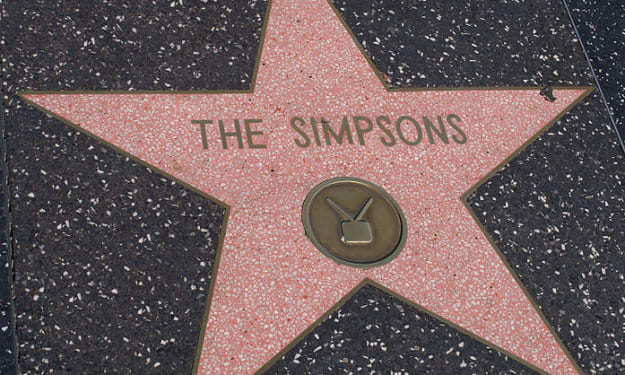



Comments
There are no comments for this story
Be the first to respond and start the conversation.